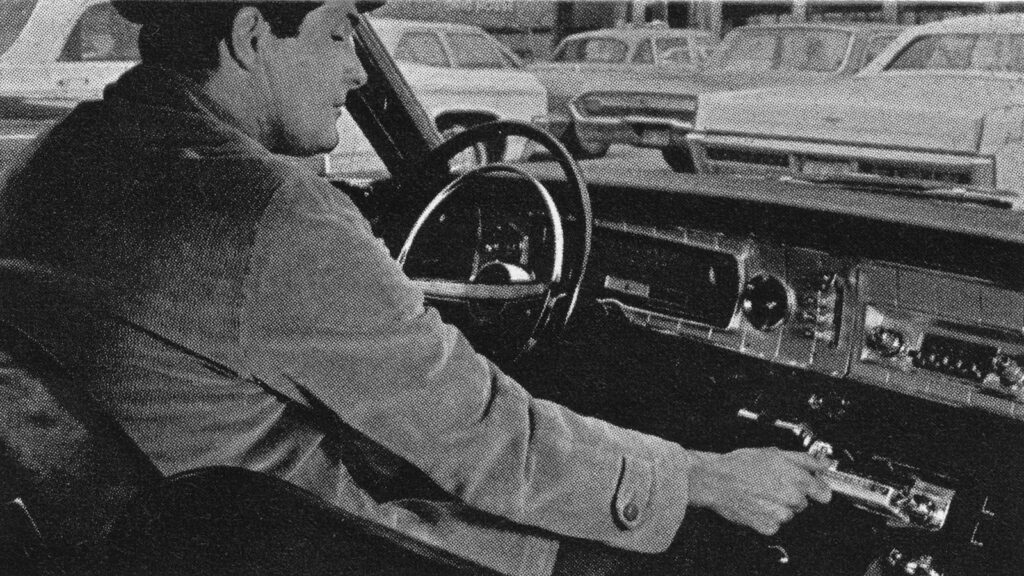If You Really Want to Be Spiritually Rich, Start by Using Only What Belongs to You.

by Bishop Philaretos
I must have been about 3 years old, so that would make the year 1967. My father, a captain of the Merchant Marines, was away at sea. My mother, as always, took me to visit my grandmother, her mother-in-law. We arrived at my grandmother’s home through a series of bus rides.
As our visit was ending, my father’s oldest brother (actually one of his oldest brothers- the first-born were twin boys) appeared and insisted on taking us to our home. My mother initially refused but finally accepted and the three of us set off. My uncle’s car at the time was one of those big American cars of the 1960s. I don’t remember its make, but it was big and in the one-piece big front seat sat my uncle at the wheel, little me in the middle, and my mother on the passenger’s side.

Right in front of me in the middle of the car was an 8-track cassette player which were popular at the time. Our own car didn’t have an 8-track player but somehow at the age of three, I knew that those big cassettes had to be pushed into the player and the cassette would play. Sticking out of uncle’s 8-track player was a cassette just waiting to be pushed in!

I put out my finger to push the cassette in. Before touching the cassette, I raised my little head to look up at my mother. One glance was enough. Some 52 years later I still remember the look she gave me. There was no need for her to speak at that moment! I quickly withdrew my hand and waited for the lesson that mother was never too tired to give.
We arrived home and thanked my uncle for the lift. We got out of the car and the moment for the lesson had arrived. My mother explained to me that we should never use or even touch something that doesn’t belong to us. That lesson remained with me for my whole life.
In the spiritual life, there are many things that don’t “belong” to us. We haven’t worked for them. We haven’t been given them yet either. We haven’t earned them for sure, nor have we prepared ourselves to receive such lofty gifts. Spirituality has a process of growth. God is a loving Father and He won’t give gifts where there is no humility as that wouldn’t be a gift at all if we didn’t know how to use it.
Some come to Holy Orthodoxy wanting the highest spiritual gifts. They do very well wanting them! However, spiritual gifts, such as unceasing prayer of the heart, are given to those who have earned the basic foundation for such gifts. They are not gifts that belong to the first stages of Christian life. In our sinful times, we should be happy with working to prepare such a basic foundation of Christian life without fantasizing that we have received already or will shortly receive those highest gifts. That doesn’t mean we won’t be saved! It’s just that we won’t be allowed to use those gifts that do not yet belong to us.
A few days ago, while thinking about this subject, I received an email from Dr. Vladimir Moss. In it, he included a parable of Saint Ignatius Brianchaninov. It was exactly what I had been thinking of. I’ll end this post with this very parable:
A rich landlord gave a sumptuous dinner to His friends and acquaintances and to a large number of people whom He invited to the dinner so as to enlarge His circle of friends and acquaintances. An infinite quantity of foods of unimaginable and unthinkable quality was provided for the guests on the table. At the end of the dinner, the guests were generously given gifts. When the invited guests of honor had left, the landlord looked outside the hall and saw at the doors a crowd of hungry beggars who would have been glad to enjoy the scraps that remained after the wonderful dinner. The most merciful Lord told the servants to stop clearing the table. He invited the beggars to come in, notwithstanding their filth and rags which were quite out of keeping with the magnificence of the wedding hall, and He set before them the remains of the banquet. Timidly and wonderingly the beggars entered the spacious hall, went up to the table, and stood by it just where they happened to be, and each beggar began to take and eat whatever he found lying before him. They picked up scraps. Naturally, none of them tasted a single whole dish, or saw the orderly attendance of the servants, or the precious plate and cutlery which were used by the guests, or heard the vast choir of singers or the music which resounded throughout the universe and rose to heaven. That is why none of the beggars, even though there were some among them with natural intelligence, could form a clear and exact idea for himself of the banquet. Having satisfied themselves with the scraps, they had to be content with a conjectural and approximate idea of the splendid and delicious dinner that the honored guests had enjoyed. Having cleaned up everything edible on the table, the beggars fell at the feet of the Landlord, thanking Him for food such as they had never eaten or seen before. He said to them, “Brothers, in making my arrangements for the banquet, I did not have all of you in view. So I have not given you a proper dinner and I am not giving you the gifts which have all been given away according to a previously made calculation which only I can understand.” With one voice the beggars exclaimed, “Lord, who are we to have gifts or a grand dinner! We are unspeakably grateful that you have not disdained us. You have admitted us, who are racked with every kind of defect, to your wedding hall and have saved us from starving to death.” The beggars dispersed, thanking and blessing the kind-hearted landlord. Then, turning to the servants, He said: “Now clear the table and lock up my hall. There will be no more guests, and what could have been offered in the way of food has been offered. Everything is finished.”







